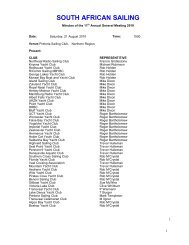Download the Racing Rules - South African Sailing
Download the Racing Rules - South African Sailing
Download the Racing Rules - South African Sailing
Create successful ePaper yourself
Turn your PDF publications into a flip-book with our unique Google optimized e-Paper software.
Appendix M<br />
<br />
<br />
<br />
<br />
<br />
<br />
<br />
<br />
RECOMMENDATIONS FOR PROTEST COMMITTEES<br />
Allow anyone, including a boat’s crew, to give evidence. It is<br />
<strong>the</strong> party who normally decides which witnesses to call,<br />
although <strong>the</strong> protest committee may also call witnesses (rule<br />
63.6). The question asked by a party ‘Would you like to hear<br />
N’ is best answered by ‘It is your choice.’<br />
Call each party’s witnesses (and <strong>the</strong> protest committee’s if any)<br />
one by one. Limit parties to questioning <strong>the</strong> witness(es) (<strong>the</strong>y<br />
may wander into general statements).<br />
Invite <strong>the</strong> protestee to question <strong>the</strong> protestor’s witness first (and<br />
vice versa). This prevents <strong>the</strong> protestor from leading his<br />
witness from <strong>the</strong> beginning.<br />
Allow members of <strong>the</strong> protest committee who saw <strong>the</strong> incident<br />
to give evidence (rule 63.6), but only while <strong>the</strong> parties are<br />
present. Members who give evidence may be questioned,<br />
should take care to relate all <strong>the</strong>y know about <strong>the</strong> incident that<br />
could affect <strong>the</strong> decision, and may remain on <strong>the</strong> protest<br />
committee (rule 63.3(a)).<br />
Try to prevent leading questions or hearsay evidence, but if<br />
that is impossible discount <strong>the</strong> evidence so obtained.<br />
Accept written evidence from a witness who is not available to<br />
be questioned only if all parties agree. In doing so <strong>the</strong>y forego<br />
<strong>the</strong>ir rights to question that witness (rule 63.6).<br />
Ask one member of <strong>the</strong> committee to note down evidence,<br />
particularly times, distances, speeds, etc.<br />
Invite first <strong>the</strong> protestor and <strong>the</strong>n <strong>the</strong> protestee to make a final<br />
statement of her case, particularly on any application or<br />
interpretation of <strong>the</strong> rules.<br />
M3.3 Find <strong>the</strong> facts (rule 63.6).<br />
Write down <strong>the</strong> facts; resolve doubts one way or <strong>the</strong> o<strong>the</strong>r.<br />
Call back parties for more questions if necessary.<br />
When appropriate, draw a diagram of <strong>the</strong> incident using <strong>the</strong><br />
facts you have found.<br />
M3.4 Decide <strong>the</strong> protest or request for redress (rule 64).<br />
Base <strong>the</strong> decision on <strong>the</strong> facts found (if you cannot, find some<br />
more facts).<br />
147





